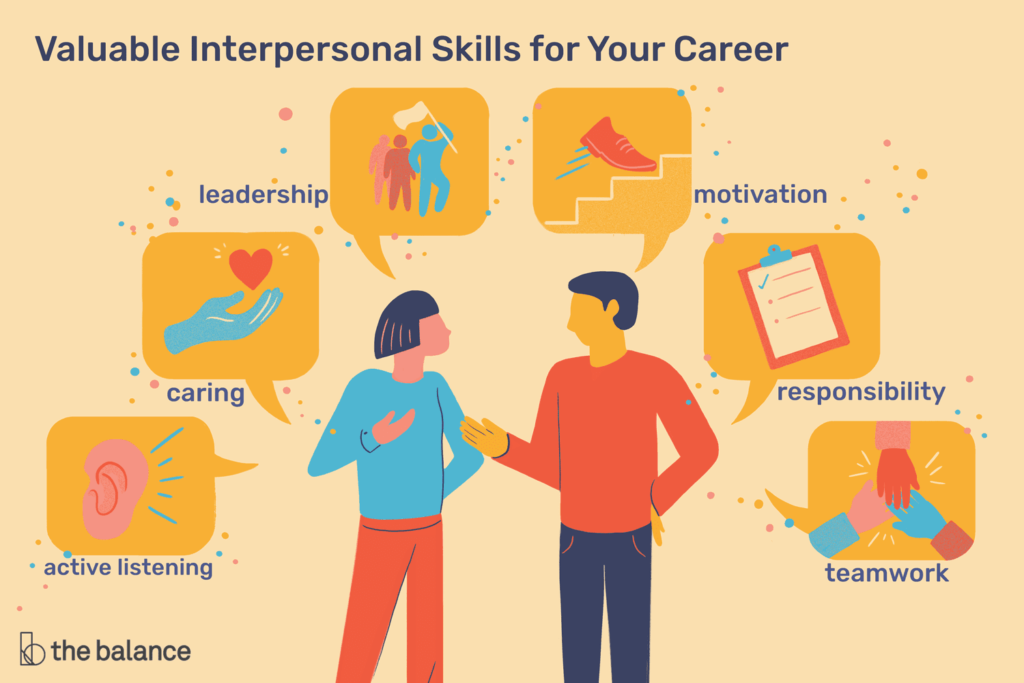
In today’s fast-paced and demanding world, finding a balance between our personal relationships and individual careers can often feel like a never-ending challenge. Juggling the demands of work and maintaining healthy relationships can leave us feeling overwhelmed and stretched thin. However, with the right strategies and mindset, it is possible to strike a harmonious balance that allows us to succeed both professionally and personally. The key lies in understanding ourselves, setting boundaries, and prioritizing what truly matters to us. Find out how you can navigate this delicate balance and create a fulfilling life that encompasses both strong relationships and a thriving career.

This image is property of www.growingself.com.
Understanding the importance of balance
Recognizing the impact of unbalanced relationships and careers
Finding balance holds significant importance in our lives, especially when it comes to managing our relationships and our careers. It is crucial to acknowledge that an unbalanced approach can have a detrimental impact on both aspects of our lives. When our relationships are not given the time and attention they deserve, they can suffer from neglect, leading to misunderstandings, conflicts, and even potential breakups. Similarly, when our careers are prioritized at the expense of our personal lives, we may experience burnout, fatigue, and a lack of fulfillment. Therefore, understanding the consequences of an unbalanced approach can motivate us to proactively seek equilibrium.
Realizing the benefits of a balanced approach
On the other hand, embracing and striving for balance can bring about numerous benefits. By prioritizing both our relationships and our careers, we can create a harmonious coexistence that allows us to thrive in all aspects of our lives. A balanced approach enables us to nurture our personal connections while also pursuing professional growth and success. It cultivates a sense of fulfillment, happiness, and overall well-being, as we are able to engage fully in both our personal and professional pursuits. Recognizing the advantages of balance can inspire us to adopt a proactive mindset and make conscious efforts to achieve equilibrium in our lives.
Prioritizing self-care and personal growth
Setting boundaries for personal time
Prioritizing self-care and personal growth is an essential component of achieving balance in our lives. One way to accomplish this is by setting boundaries for personal time. Dedicate specific periods for activities that recharge, relax, and rejuvenate you. Whether it’s indulging in a hobby, spending time with loved ones, or simply enjoying some solitude, carving out this personal time allows you to replenish your energy and foster your well-being. Communicate your boundaries to your partner and ensure they understand that this time is crucial for your overall balance and should be respected.
Engaging in activities that promote personal well-being
Engaging in activities that promote personal well-being is another key aspect of finding balance. Be mindful of activities that bring you joy, reduce stress, and improve your overall mental, emotional, and physical health. Exercise regularly, practice mindfulness or meditation, engage in hobbies, or pursue learning opportunities that align with your interests. Investing time in these activities will not only enhance your personal well-being but also positively impact your relationships and career by fostering a sense of contentment and fulfillment.
Investing in personal development and growth
Investing in personal development and growth is crucial for maintaining balance in your life. Continuously strive to expand your knowledge, skills, and abilities. Attend workshops, take courses, or engage in self-study to enhance your professional expertise. Additionally, focus on personal growth by identifying areas for improvement, setting goals, and taking steps toward self-improvement. This investment in yourself will not only benefit your career but also enrich your relationships by contributing to your overall growth and fulfillment.
Effective communication with partners
Establishing open and honest communication channels
Effective communication with our partners plays a vital role in maintaining balance between our relationships and careers. Establishing open and honest communication channels is essential for understanding each other’s needs, desires, and concerns. Make a conscious effort to create a safe and non-judgmental space where both partners can express themselves freely. Regularly check in with each other to discuss any challenges or conflicts that may arise. By fostering open communication, you can address issues promptly, make necessary adjustments, and ensure that both your relationship and career are given the attention they deserve.
Discussing individual career goals and ambitions
To achieve balance, it is crucial to have open and honest conversations about individual career goals and ambitions. Share your aspirations with your partner and encourage them to do the same. By understanding each other’s professional desires, you can provide support, encouragement, and assistance in achieving those goals. Discuss any potential conflicts or challenges that may arise due to career aspirations and explore ways to navigate them together. Through these discussions, you can align your ambitions in a way that allows both partners to pursue fulfilling careers while maintaining a healthy relationship.
Creating a supportive environment for each other
Creating a supportive environment for each other is essential for balancing relationships and careers. By being each other’s cheerleaders, you can promote and facilitate mutual growth and success. Celebrate each other’s achievements, offer words of encouragement during challenging times, and provide a helping hand when needed. By actively supporting and uplifting one another, you create a foundation of trust, love, and collaboration that enables both partners to thrive in their careers while nurturing a strong, fulfilling relationship.
Negotiating shared responsibilities
Identifying and dividing household and family responsibilities
Negotiating shared responsibilities is crucial for maintaining balance between relationships and careers. Begin by identifying the household and family responsibilities and discuss how they can be divided fairly. Consider each partner’s strengths, preferences, and availability when assigning tasks. Aim for a distribution that is equitable and takes into account the demands of both partners’ careers. Regularly reassess the allocation of responsibilities and make adjustments as needed to ensure a balance that benefits both partners.
Finding a workable balance for both partners
Finding a workable balance for both partners is key to achieving harmony. Recognize that the definition of balance may evolve over time due to changing circumstances and individual needs. Be willing to compromise and collaborate to find solutions that accommodate both partners’ career demands while still nurturing the relationship. This may require flexibility, creativity, and ongoing communication. By actively seeking a workable balance, you can create an environment that supports both partners’ growth and success.
Reassessing and adjusting responsibilities as needed
As circumstances evolve, it is essential to regularly reassess and adjust responsibilities. What worked previously may not be optimal in the present. Stay open to reevaluating the division of tasks and responsibilities to address any imbalances that may arise. Be adaptable and willing to make changes that better align with the needs of both your relationship and careers. Regularly communicating and discussing these adjustments will contribute to an ongoing sense of balance and fulfillment.

This image is property of hips.hearstapps.com.
Flexibility and adaptability
Adapting to changing circumstances and priorities
Flexibility and adaptability are crucial in balancing relationships and careers. Recognize that circumstances and priorities can shift over time. Career promotions, new opportunities, or personal events may require adjustments to be made. Remain open to adapting your plans, schedules, and expectations. Embrace the concept of fluidity, recognizing that maintaining balance may involve temporary imbalances or trade-offs. By being flexible and adaptable, both partners can navigate the ever-changing landscape and continue to nurture their relationship while pursuing their individual career goals.
Being open to compromise and alternative solutions
Balance often requires compromise and the exploration of alternative solutions. Recognize that both partners may have different expectations and needs at times. Be willing to find middle ground, seek alternative paths, and embrace compromises that accommodate both partners’ desires and ambitions. This may involve adjusting timelines, sharing responsibilities, or exploring unconventional solutions. By fostering a spirit of openness and collaboration, you can find innovative ways to maintain balance while ensuring both partners’ needs are met.
Embracing a flexible mindset
Embracing a flexible mindset is essential in finding balance between relationships and careers. Accept that there will be challenges and obstacles along the way. Rather than becoming overwhelmed or discouraged, approach these challenges with a solution-oriented and adaptable mindset. Be willing to try new approaches, seek support when needed, and adjust your plans as necessary. By embracing flexibility, you can navigate the complexities of maintaining balance and find harmony in both your personal and professional pursuits.
Scheduling and time management
Creating a shared calendar for important events
Scheduling and time management are essential tools for achieving balance. Start by creating a shared calendar that includes important events for both partners, such as work commitments, family gatherings, date nights, and personal appointments. By having a visual representation of each other’s schedules, you can identify potential conflicts and plan accordingly. This shared calendar fosters transparency, helps prioritize commitments, and allows for effective planning to ensure both relationship and career obligations are met.
Utilizing effective time management techniques
Utilize effective time management techniques to optimize productivity and create space for both relationships and careers. Prioritize tasks based on urgency and importance, delegate when appropriate, and set realistic deadlines. Explore time-saving strategies such as batch working, setting boundaries around email and social media, and utilizing tools and technology to streamline processes. By effectively managing your time, you can minimize stress, enhance productivity, and create a sense of balance that benefits both your professional and personal life.
Finding ways to spend quality time together
It is important to find ways to spend quality time together despite busy schedules. Prioritize quality over quantity when it comes to spending time with your partner. Even short, intentional moments can have a significant impact on your relationship. Plan dates, engage in activities you both enjoy, and make an effort to connect and communicate. Take advantage of technology to stay connected throughout the day, when physical presence may not be possible. By consciously prioritizing and making the most out of the time you have together, you can nurture your relationship and maintain the balance between love and career.

This image is property of www.thebalancemoney.com.
Support systems and seeking help
Building a strong support network
Building a strong support network is crucial in maintaining balance between relationships and careers. Surround yourself with individuals who understand and support your desire for balance. Foster relationships with friends, family members, and colleagues who can provide guidance, encouragement, and a listening ear. Cultivate a community that can offer both emotional support and practical help when needed. By leveraging these support systems, you can navigate the challenges that come with balancing relationships and careers with a sense of confidence and resilience.
Seeking professional guidance when necessary
There may be times when seeking professional guidance becomes necessary. If you find yourself struggling to maintain balance or experiencing conflicts that hinder both your relationship and career, consider seeking the help of a relationship counselor or career coach. These professionals can provide objective guidance, tools, and strategies to help you navigate the complexities of balancing both aspects of your life. Seeking professional help demonstrates a commitment to your own growth and the success of your relationship and career.
Recognizing the value of external assistance
Recognize the value of external assistance in achieving balance. When circumstances become overwhelming or time constraints limit your ability to manage everything on your own, outsourcing tasks or seeking help can be invaluable. Consider hiring a housekeeper, utilizing meal delivery services, or enlisting the support of family and friends to alleviate some of the responsibilities. By recognizing that it is not feasible to do everything alone, you can maintain your well-being, focus on important priorities, and preserve the balance between your relationship and career.
Maintaining work-life boundaries
Avoiding bringing work-related stress into personal relationships
Maintaining work-life boundaries is crucial for the well-being of both your relationship and your career. Avoid bringing work-related stress into your personal relationships. When you spend time with your partner, make a conscious effort to be present and fully engaged. Practice leaving work concerns at the office and refrain from discussing work-related stressors that may negatively impact your time together. By creating a clear separation between work and personal life, you can preserve the quality of your relationship and ensure a healthy work-life balance.
Creating a clear separation between work and personal life
Creating a clear separation between work and personal life is key to maintaining balance. Establish designated spaces and times for work and personal activities. Whether it’s setting up a home office or creating a daily routine that allows for focused work and dedicated personal time, clearly demarcating these areas contributes to a sense of balance. Communicate these boundaries to your partner, colleagues, and clients, so they understand and respect your need for separation. By establishing this delineation, you can maintain both the productivity of your career and the quality of your relationships.
Establishing boundaries that promote work-life balance
Establishing boundaries that promote work-life balance is essential for maintaining a healthy equilibrium. Determine your non-negotiables and communicate them to those who may be impacted by them. Whether it’s not checking work emails after a certain hour, having designated days off, or refusing to take on additional workload that encroaches on personal time, setting boundaries will help ensure both your relationship and your career are given the attention they deserve. By advocating for your own well-being and balance, you create an environment that fosters both personal fulfillment and professional success.

This image is property of image.marriage.com.
Regularly reassessing priorities
Reflecting on personal and professional goals
Regularly reassessing priorities is crucial for maintaining balance between relationships and careers. Take the time to reflect on your personal and professional goals. Evaluate whether your current actions and commitments align with these goals or if adjustments are necessary. Consider the impact of your choices on both your relationship and your career. By regularly reflecting on your priorities, you can identify areas that may require more attention, make necessary adjustments, and ensure that both aspects of your life are in alignment with your desired outcomes.
Reevaluating the balance between career and relationships
Reevaluating the balance between your career and relationships periodically is essential for long-term harmony. Ask yourself if the current balance aligns with your values and the level of fulfillment you desire in both areas. Assess whether any shifts or modifications need to occur to better align your priorities. Be open to discussing these reflections with your partner and seek their input and perspective. By reevaluating the balance between your career and relationships, you can ensure continued growth, satisfaction, and success in both areas.
Making adjustments and setting new priorities
Upon reflection, be prepared to make adjustments and set new priorities that will help you maintain balance. This may involve reprioritizing tasks, shifting focus, or revisiting long-term goals. Communicate these adjustments to your partner, job, and any relevant stakeholders, ensuring that your new priorities are understood and supported. By staying adaptable and proactive, you can navigate the ebb and flow of life’s demands while maintaining balance and harmony in your relationships and career.
Embracing compromise and collaboration
Finding mutually beneficial solutions
Embracing compromise and collaboration is essential in maintaining balance between relationships and careers. Recognize that finding mutually beneficial solutions often requires a willingness to meet in the middle. Strive for win-win situations where both partners are able to achieve their goals while honoring the needs and desires of the other. Explore creative possibilities, brainstorm ideas, and be open to innovative approaches that cater to both the relationship and professional aspirations. By embracing compromise, you can foster a healthy and supportive environment that facilitates growth and success for both partners.
Working together towards common goals
Working together towards common goals is instrumental in achieving balance. Identify shared vision and values that align in both your relationship and your careers. This shared purpose can serve as a guiding force and a unifying factor. By collaborating and pooling resources, skills, and networks, both partners can work towards shared goals while maintaining balance. Regularly communicate, strategize, and celebrate accomplishments together to foster a sense of togetherness and momentum in your journey towards individual and shared success.
Finding middle ground in conflicting situations
Conflict is inevitable in any relationship, and finding middle ground is essential when conflicts arise. Recognize that compromise may be necessary to resolve conflicting situations. Explain your perspectives calmly and respectfully, and actively listen to your partner’s points of view. Seek common ground and explore alternative solutions that address both parties’ concerns. By finding middle ground in conflicting situations, you can foster understanding, strengthen your relationship, and maintain a healthy balance between personal and professional endeavors.
In conclusion, balancing relationships with individual careers is a challenging but necessary endeavor. Recognizing the impact of an unbalanced approach and understanding the benefits of achieving equilibrium can motivate us to prioritize self-care, engage in effective communication, negotiate shared responsibilities, embrace flexibility, and practice time management. Building support systems, maintaining work-life boundaries, regularly reassessing priorities, and embracing compromise and collaboration are also essential. By actively working towards balance, we can nurture our relationships, pursue our career aspirations, and lead fulfilling lives that encompass both love and professional success.






